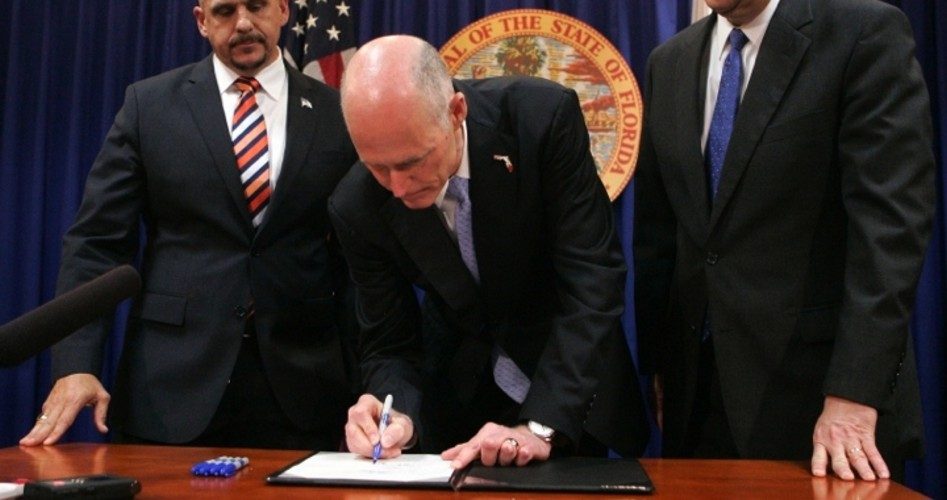
Just hours ago, Governor Rick Scott (shown) of Florida signed into law the Freedom from Unwarranted Surveillance Act, a measure strictly regulating the use of drones by law enforcement in the Sunshine State, according to a report filed by the Miami Herald.
Governor’s Scott’s signature comes just one week after the bill – SB 92 – was approved unanimously by the state House of Representatives. The state Senate had passed the bill unanimously just a week before the House.
Although the governor’s office had released no comment on the signing as of press time, an earlier statement telegraphed his intention to support the bill: “This law will ensure that the rights of Florida families are protected from the unwarranted use of drones and other unmanned aircraft,” Scott said.
Specifically, the new law forbids federal agents “from using a drone to gather evidence or other information” on citizens of Florida. Should a state citizen be the target of an unlawful search and seizure in violation of this bill, he or she would be authorized “to initiate a civil action in order to prevent or remedy” that violation.
As The New American reported earlier, the language of the law is not perfect. Section 4(a) of the bill carves out a dangerous exception to its otherwise commendable constitutional protections.
Section 4(a) authorizes the Secretary of the Department of Homeland Security to launch a drone over Florida (and seemingly violate the Fourth Amendment’s protection of “the right of the people to be secure in their persons, houses, papers, and effects, against unreasonable searches and seizures”) “to counter a high risk of a terrorist attack by a specific individual or organization.”
That is an enormous loophole, one just large enough for a Hellfire missile. Such an occurrence is not unthinkable in this era when the United States has been declared a battleground and Congress has given the president the power to indefinitely detain any American he believes to be aiding enemies of the state. Ostensibly, drones would be the perfect tool to accomplish such round-up of potential prisoners. (See, for example, the comments made by Senator Lindsey Graham [R-S.C.] regarding the search for the suspected Boston marathon bomber.)
With his signature, Governor Scott joins his fellow executives in Idaho and Virginia in enacting a state law restricting the use of drones in the targeting and tracking of individuals and attempting to protect the “right of the people to be secure in their persons, houses, papers, and effects, against unreasonable searches and seizures’” as guaranteed by the Fourth Amendment.
The need for such state efforts to shore up this basic right is urgent.
While the sight of drones over U.S. cities and towns is rare right now, the Federal Aviation Administration (FAA) predicts that by 2020, 30,000 of these unmanned aerial vehicles (UAV) will be patrolling American airspace. Scores of these UAVs will be deployed by state and local law enforcement, adding to the many that will be sent airborne by the federal government.
With the rise of the drones comes the rise of several critical questions of constitutionality of their potential uses. One of the most crucial of those inquiries concerns the application of the Fourth Amendment’s prohibition against “unlawful searches and seizures” and the requirement that warrants be supported by affidavits “particularly describing the place to be searched, and the persons or things to be seized.”
In addition to the efforts of state governments, there are federal lawmakers joining the fight to preserve the Fourth Amendment, as well.
Last June, Senator Rand Paul (R-Ky.) introduced a bill to “protect individual privacy against unwarranted governmental intrusion through the use of unmanned aerial vehicles commonly called drones.”
Paul’s bill mandates:
A person or entity acting under the authority [of], or funded in whole or in part by, the Government of the United States shall not use a drone to gather evidence or other information pertaining to criminal conduct or conduct in violation of a statute or regulation except to the extent authorized in a warrant that satisfies the requirements of the Fourth Amendment to the Constitution of the United States.
Senator Paul explained, “Americans going about their everyday lives should not be treated like criminals or terrorists and have their rights infringed upon by military tactics.”
Although we rightly castigate elected officials when they violate the Constitution, we should likewise recognize their praiseworthy efforts to safeguard our most basic and cherished civil liberties.
Accordingly, citizens of Missouri, Oregon, Illinois, Montana, and Tennessee are encouraged to contact their elected state representatives to demand their support for bills currently pending in those states. One or more of the houses of the state legislature in those states have passed measures aimed at prohibiting law enforcement from using drones to violate those rights protected by the Fourth Amendment.
Photo of Florida Governor Rick Scott signing the Freedom from Unwarranted Surveillance Act: AP Images
Joe A. Wolverton, II, J.D. is a correspondent for The New American and travels frequently nationwide speaking on topics of nullification, the NDAA, and the surveillance state. He can be reached at [email protected].



